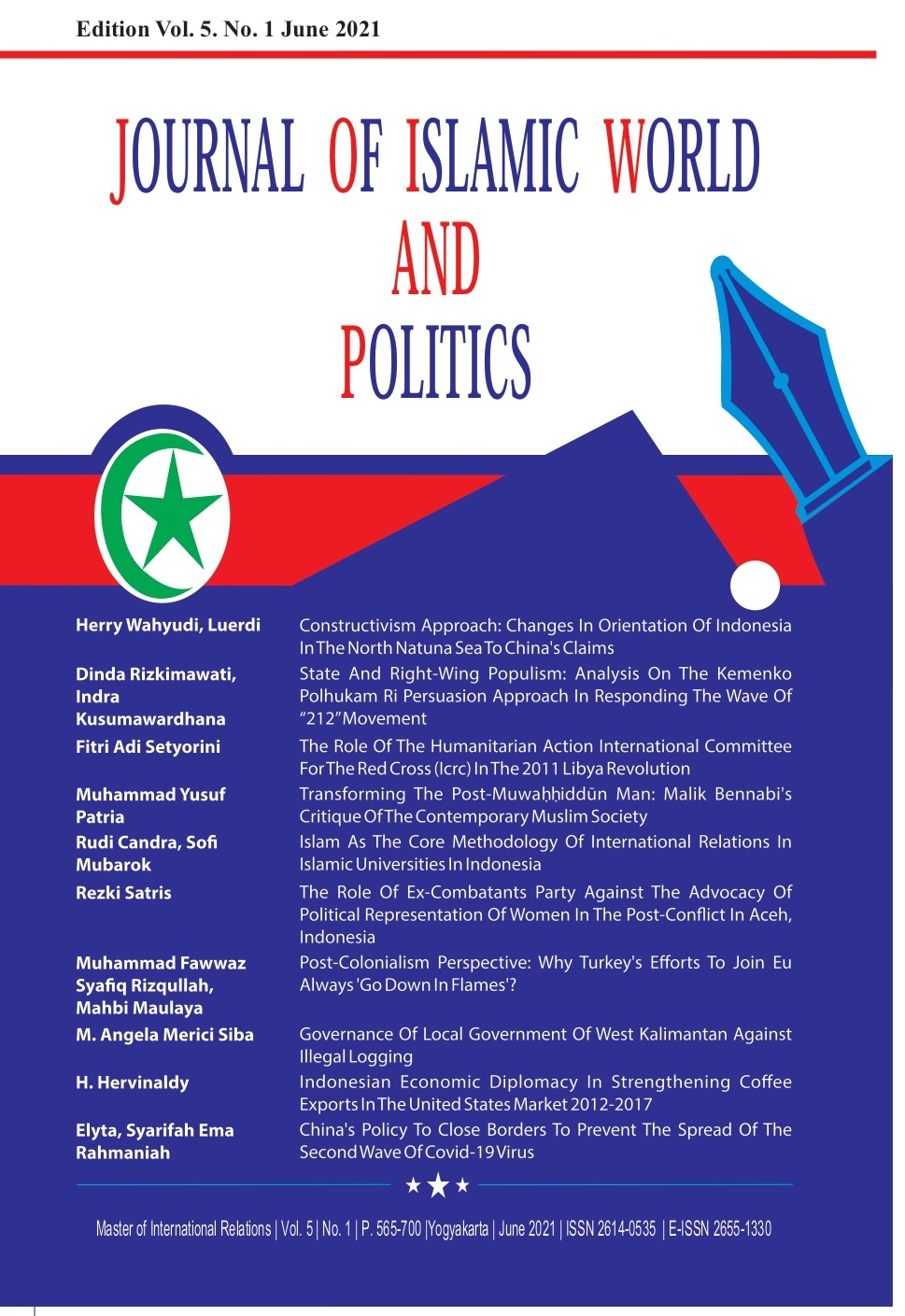Islam as the Core Methodology of International Relations in Islamic Universities in Indonesia
DOI:
https://doi.org/10.18196/jiwp.v5i1.10242Keywords:
Islamization, International Relations, Methodology, UNIDA Gontor, UMY, UIN Sunan Ampel,Abstract
This condition reminds us of the vital role and urgency of developing a methodology of Islamic international relations. In response to this issue, it is necessary to carry out an analysis of the development and application of Islamic international relation methods in Indonesian Universities, in this case, taking the example of three universities: Darussalam University (UNIDA) Gontor, Universitas Muhammadiyah Yogyakarta (UMY), and UIN Sunan Ampel Surabaya. These three universities were chosen because they officially declared the development of Islamization or integration of science in the curriculum of the international relations study program. This study aims to analyze the methodological model of Islamic international relations in three universities to be compared and evaluated for their implementation. This type of research was qualitative descriptive by taking the research settings at UNIDA, UMY, and UIN Sunan Ampel. Data collection techniques were through observation, interviews, and limited discussion. Data analysis utilized an interactive model with a four-component analysis approach: data reduction, data analysis, data clarification, and drawing conclusions carried out actively and interactively with source persons as the primary data sources equipped with several secondary sources. This study found that these three universities used three different methods in embodying the concept of Islam in international relations. UNIDA Gontor has its Islamization project, UMY has Islam as the curriculum characteristic, and UIN Sunan Ampel has the integrated twin tower concept. Although these three models have elementary differences, they have the spirit of developing the internalization of Islamic studies in the study of international relations.
References
Draft Dokumen Kurikulum Berbasis Outcme Based Education (OBE) tahun 2020-2024. (2020). Ponorogo: Program Studi Hubungan Internasional .
Lembaga Pengkajian dan Pengamalan Islam. (den 12 November 2020). Hämtat från LPPI UMY: https://lppi.umy.ac.id/
Acharya, A. a. (2010). Why Is There no Non-Western International Relations Theory? An Introduction. i A. a. Acharya, Non-Western International Relations Theory: Perspectives on and beyond Asia. Routledge.
al-Attas, S. M. (1995). Prolegomena to The Metaphysics of Islam. Kuala Lumpur: ISTAC.
Al-Attas, S. M.-N. (1972). Islam Dalam Sejarah Dan Kebudayaan Melayu. Petaling Jaya: ABIM.
Armayanto, H. (September 2007). Relevansi Islamisasi Ilmu Pengetahuan Kontemporer. Jurnal Studi Agama-Agama dan Pemikiran Islam, 15-33.
Daud, W. M. (1998). The Educational Philosophy and Practice of Sayyed Muhammad Naquib al-Attas – An Exposition of the Original Concept of Islamization. Kuala Lumpur: ISTAC.
Faruqi, I. R. (1995). Tauhid. Bandung: Pustaka.
Hakiem, F. N. (den 25 8 2020). Islamization of International Relations in UNIDA Gontor. (R. Candra, & S. Mubarok, Intervjuare)
Hakim, M. F. (2017). Paradigma Integrated Twin Towers dalam Studi Hubungan Internasional Kontemporer. Journal of Integrative International Relations, 3(2), 1-17.
Hakim, M. F. (den 12 July 2019). Perkembangan dan Tantangan HI Islam di Indonesia. (R. C. Sofi Mubarok, Intervjuare)
M. Syahrul Syarifuddin, S. (2020). Panduan Universitas; Universitas Darussalam Gontor 1440/1441 / 2020/2021. Ponorogo: UNIDA Gontor Press.
Mubarok, S., & Candra, R. (2020). Islamic International Relations as a Potential Tool to Indonesia’s Soft Power Diplomacy. 1st Borobudur International Symposium on Humanities, Economics and Social Sciences (BIS-HESS 2019) (ss. 954-959). Atlantis Press.
Mubarok, S., & Chandra, R. (den 20 8 2019). Islamic Perspective in International Relations. The Journal of Islamic Studies and International Relations, 4(1), 1-16.
Soleh, A. K. (2011). Mencermati konsep Islamisasi ilmu Ismail R Faruqi. Ulul Albab, 1-21.
Surwandono. (den 14 September 2020). Islam dan Metodologi ilmu Hubungan Internasional di Universitas Muhammadiyah Yogyakarta. (S. Mubarok, Intervjuare)
Syaifuddin, H. (2016). Studi Komparasi Integrasi Keilmuan Berbasis Islamisasi. Surabaya: Universitas Islam Negeri Sunan Ampel Surabaya.
Wendt, A. (2014). Metodologi ilmu hubungan internasional: perdebatan paradigmatik dan pendekatan alternatif. i J. S. Alexander Wendt. Malang: Intrans Publishing.
Downloads
Published
Issue
Section
License
License
Journal of Islamic World and Politics is licensed under an Attribution-ShareAlike 4.0 International (CC BY-SA 4.0) license. You are free to:
- Share — copy and redistribute the material in any medium or format
- Adapt — remix, transform, and build upon the material for any purpose, even commercially. This license is acceptable for Free Cultural Works.
The licensor cannot revoke these freedoms as long as you follow the license terms.
- Attribution — You must give appropriate credit, provide a link to the license, and indicate if changes were made. You may do so in any reasonable manner, but not in any way that suggests the licensor endorses you or your use.
- ShareAlike — If you remix, transform, or build upon the material, you must distribute your contributions under the same license as the original.
- No additional restrictions — You may not apply legal terms or technological measures that legally restrict others from doing anything the license permits.
Copyright
Authors who publish with this journal agree to the following terms:
- Authors retain copyright and grant the journal right of first publication with the work simultaneously licensed under an Attribution-ShareAlike 4.0 International (CC BY-SA 4.0) that allows others to share the work with an acknowledgment of the work's authorship and initial publication in this journal.
- Authors are able to enter into separate, additional contractual arrangements for the non-exclusive distribution of the journal's published version of the work (e.g., post it to an institutional repository or publish it in a book), with an acknowledgment of its initial publication in this journal.
- Authors are permitted and encouraged to post their work online (e.g., in institutional repositories or on their website) prior to and during the submission process, as it can lead to productive exchanges, as well as earlier and greater citation of published work (See The Effect of Open Access).

